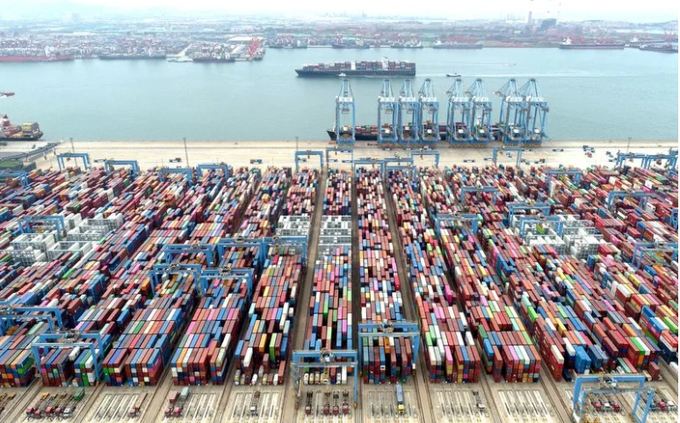June 13, 2025 | 10:26 GMT +7
June 13, 2025 | 10:26 GMT +7
Hotline: 0913.378.918
June 13, 2025 | 10:26 GMT +7
Hotline: 0913.378.918

Containers and cargo vessels at the Qingdao port.
The disappointing trade figures follow other indicators showing patchy growth in November, suggesting Beijing needs to do more to shore up a faltering economy that is only likely to face further challenges next year.
Outbound shipments grew 6.7% last month, customs data showed on Tuesday, missing a forecast 8.5% increase and down from a 12.7% rise in October.
Of more concern for authorities, imports shrank 3.9%, their worst performance in nine months and dashing expectations for a 0.3% increase, keeping alive calls for more policy support to prop up domestic demand.
Top leaders on Monday vowed to ramp up stimulus in 2025, shifting the language around China's monetary and fiscal settings to more accommodative wording in a bid to rev up demand and entice consumers back into spending.
"Global demand is not super strong, data from other major exporters like South Korea and Vietnam point to different levels of slowdown too," said Xu Tianchen, senior economist at the Economist Intelligence Unit.
"Early signs of trade frontloading in anticipation of Trump's tariffs next year have started to emerge, but the full impact will not be felt until the coming months, especially December and January," he added.
U.S. President-elect Trump has pledged to slap an additional 10% tariff on Chinese goods in a bid to force Beijing to do more to stop the trafficking of chemicals used to make fentanyl. He had previously said he would introduce tariffs in excess of 60%.
His threats have rattled China's industrial complex, which sells goods worth more than $400 billion annually to the U.S.
Ahead of expected tariff hikes, exporters rushed to shift stock to U.S. warehouses in October, anticipating shipments for fresh orders once global demand recovers.
While that trend slowed sharply in November, frontloading ahead of expected tariffs may still support exports.
"We expect exports to accelerate again in the coming months, supported by gains in export competitiveness and exporters front-running tariffs," said Zichun Huang, China economist at Capital Economics.
However, unresolved tensions with the European Union over tariffs of up to 45.3% on China-made electric vehicles threaten to open a second front in Beijing's trade war with the West.
China's trade surplus grew to $97.44 billion last month, up from $95.72 billion in October.
U.S. tariffs pose a bigger threat to China than they did during Trump's first term as the $19 trillion-dollar economy's exports are one of its main growth drivers, with household and business confidence dented by a prolonged property crisis.
While manufacturers reported the best business conditions in seven months in a November factory survey, suggesting stimulus is trickling through, they also warned they were receiving fewer export orders.
Those trends have prompted calls by analysts and policy experts for a shift away from an economic over-reliance on manufacturing and exports.
Government advisors have recommended Beijing keeps its growth target unchanged at around 5% next year and implements more forceful stimulus to mitigate the expected U.S. tariffs by leaning on the country's vast domestic consumer market.
China's economic woes prompted policymakers to act in September, with the central bank unveiling its most aggressive monetary easing since the pandemic, cutting interest rates and injecting 1 trillion yuan ($140 billion) into the financial system.
China recorded large falls in imports of commodities such as vegetable oils, rare earths and fertilisers.
Much of that was due to declines in commodity prices although that also helped volumes, which increased for crude oil, coal and copper.
Top policymakers are expected to meet this week to set key targets and policy intentions for next year.
Investors will be watching for remarks that suggest Beijing will prioritise the consumer sector in its policies, having focused this year mostly on upgrading its export-reliant manufacturing sector.
Economists expect China's imports will recover in the coming months, not least because policymakers are expected to expand the fiscal headroom next year.
"Robust fiscal expenditure, much of it likely directed toward investment, should boost demand for industrial commodities in the coming months," Capital Economics' Huang said.
(Reuters)

(VAN) Extensive licensing requirements raise concerns about intellectual property theft.

(VAN) As of Friday, a salmonella outbreak linked to a California egg producer had sickened at least 79 people. Of the infected people, 21 hospitalizations were reported, U.S. health officials said.

(VAN) With the war ongoing, many Ukrainian farmers and rural farming families face limited access to their land due to mines and lack the financial resources to purchase needed agricultural inputs.

(VAN) Vikas Rambal has quietly built a $5 billion business empire in manufacturing, property and solar, and catapulted onto the Rich List.

(VAN) Available cropland now at less than five percent, according to latest geospatial assessment from FAO and UNOSAT.

(VAN) Alt Carbon has raised $12 million in a seed round as it plans to scale its carbon dioxide removal work in the South Asian nation.

(VAN) Attempts to bring down the price of the Japanese staple have had little effect amid a cost-of-living crisis.